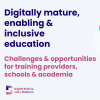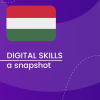Digital Theme Week - Hungary
Digital Theme Week is an initiative launched by the Hungarian Ministry of Human Resources in 2016, which promotes the responsible use of technology in education and fosters the development of digital skills for students and teachers. The initiative also aims to develop and disseminate innovative approaches in digital pedagogy within the public education system, and extend digital skills and literacy activities in subjects beyond information technology (IT).
About this initiative
Targeting schools, teachers, students, educators and stakeholders in the Hungarian public education system, Digital Theme Week brings together more than 5,000 teachers and up to 130,000 students for one week, carrying out around 2,000 digital pedagogy projects each year.
The 2024/2025 edition of the Digital Theme Week is planned for 24-28 March 2025. This year's edition focuses on several topics: digital citizenship, algorithmic thinking and programming as tools for creation, responsible use of AI in education, and digital security. Teachers and schools that choose to participate have a world of resources and pedagogical aids on Digital Theme Week's website. They also have a repository of online lectures, webinars, and a free handbook available to support learning and teaching.
The initiative essentially offers an opportunity for educators and students to develop and improve their digital skills by participating in a variety of diverse and creative projects on different topics related to the use of digital technology in education. Some pedagogy projects produced over the course of the initiative include: developing activities for students with special needs, initiatives encouraging teacher-to-teacher cooperation through collaborative projects, or knowledge-sharing on issues such as digital security and online safety for children, amongst others.
Why is this a good practice?
Since its launch, Digital Theme Week has succeeded in stimulating the development of a wider knowledge base on a national level and improving the integration of information and communication technology (ICT) in teaching and learning. As of 2019, more than 3,000 projects have been implemented, reaching nearly 8,000 teachers and 135,000 students. Having reached 10% of students so far, Digital Theme Week offers room for scalability and replicability. The initiative is sustainable through secured public funding and today represents the biggest digital pedagogy event in Hungary.
Over 800 schools participated in the 2024 edition of the Digital Theme Week in Hungary. Background information and project results are documented extensively in a knowledge base to serve as inspiration and source of ideas for digital skills activities in an educational context. Activities can also be replicated directly, depending on their target group or context.
An accessible and fully sustainable initiative
The Digital Theme Week (which celebrates its 10th anniversary in 2025!) provides a wide range of digital education resources to support teachers and students, with a special focus on facilitating remote education and learning outside of the classroom. Within the resource database of the project, teachers can access multiple tools, instruction and guidance for online distance teaching (tips on classroom organisation, or activities stimulating online collaboration and use of platforms and digital tools).
Pedagogical assistance in the form of sample project packages, learning curricula and good practices in fostering digital skills from an early age is also available via the project's knowledge database. The database also contains hundreds of resources targeting students and learners, such as handbooks, learning material, webinars, and video tutorials to act as complementary to digital education.




